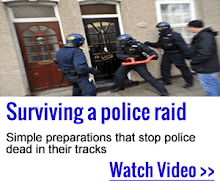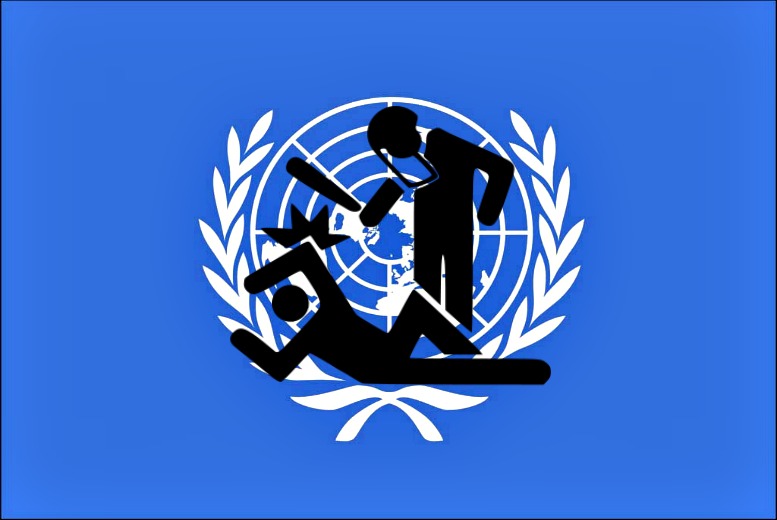Did The UN Really Install A Global Police Force At The Local Level?
By Amanda Warren
activistpost.com
While people were in a daze of reverie following the lunar eclipse and the Pope’s U.S. visit, a very important yet overlooked announcement was made by the Department of Justice.
“Launch of Strong Cities Network to Strengthen Community Resilience Against Violent Extremism” rang the bell to usher in a global-local initiative to ferret out extremism at the local level – yes, in the United States. Symbolically, it could also signal a turning point when it comes to local authorities and their treatment of the residents at large. Indeed, it is a global enmeshment that most Americans are either a) in the total dark about, or b) going hysterical over, if they’ve heard about it.
Honestly, either of those reactions is understandable when you start digging into the announcements and its sponsors only to find the typical convoluted, global-psycho-babble that signals to the astute that they are about to lose their rights and be perceived as domestic terrorists. But can anyone really say for sure? Of course not. Not when the message is written in Newspeak gibberish.
What is the Strong Cities Network and why did some U.S. cities join up?
On the face of it, SCN is to strengthen the bond between cities in the U.S. and global cities in the fight against violent extremism, internationally and at the local level. It will funnel help to local authorities of those cities which hop on board.
From the press release:
While many cities and local authorities are developing innovative responses to address this challenge, no systematic efforts are in place to share experiences, pool resources and build a community of cities to inspire local action on a global scale.
Technically, SCN doesn’t have much to do with the U.N. but people think of the U.N. because this action is global and the launch was announced on the margins of U.N. General Assembly in New York on September 29 by the UN High Commissioner for Human Rights, Prince Zeid Ra’ad Al Hussein, and New York City Mayor Bill de Blasio. To a lot of people, that match-up doesn’t bode well. The Keynote address came from U.S. Attorney General Loretta E. Lynch.
All cities are encouraged by them to join up, but the major U.S. cities that are currently a part of it are actually among the founding “Steering” committee. New York, Denver, Atlanta and Minneapolis are among the couple dozen founding cities across the world. They will all “steer” simultaneous action among city authorities and officials. And while SCN tries to portray itself as for the little guy, that couldn’t be further from the truth if you really browse around their website and cut through the B.S. language. Citizens will have virtually nothing to do with their decisions and actions unless they are of high community affluence. Just look at the information of their first global summit and see who it’s intended for and who will speak.
 SCN’s Internation Advisory Board is run by by the Institute for Strategic Dialogue (ISD) which considers itself a leading international “think-and-do” tank. It began as The Club of Three, started in the mid-1990s by Lord Weidenfeld. The Institute for Strategic Dialogue was created in 2006 as an umbrella organization and also created initiatives like Against Violent Extremism, Extreme Dialogue, Counter Extremism and European Muslim Women of Influence.
SCN’s Internation Advisory Board is run by by the Institute for Strategic Dialogue (ISD) which considers itself a leading international “think-and-do” tank. It began as The Club of Three, started in the mid-1990s by Lord Weidenfeld. The Institute for Strategic Dialogue was created in 2006 as an umbrella organization and also created initiatives like Against Violent Extremism, Extreme Dialogue, Counter Extremism and European Muslim Women of Influence.
Regular readers to this site probably don’t just think in terms of the U.N. power grab – but the myriad NGOs, institutes, think tanks, initiatives, corporate foundations etc. that seal and bolster global authority. That’s what this reeks of.
See if you can figure out the actual goals as extracted from the DOJ press release:
- Garnering partnership of cities in international efforts to build social cohesion and resilience to violent extremism
- Using persuasive voices of authorities and communities to challenge violent extremism in all of its forms and manifestations
- Capacity-building and improvement of collaboration
- To counter a range of domestic and global terror threats
- To enable cities to learn from one another, to develop best practices
- Will empower municipal bodies to fill this gap while working with civil society
- Safeguard the rights of local citizens and communities
- Determine action at all levels of governance to counter violent extremism
- Coordinate our efforts and cooperate across borders
- Connect cities, city-level practitioners and the communities through a series of workshops, trainings and sustained city partnerships
- Provide an online repository of municipal-level good practices and web-based training modules and grants supporting innovative, local initiatives and strategies
- International Steering Committee of approximately 25 cities and other sub-national entities from different regions that will provide the SCN with its strategic direction
- Use collective lessons in this international platform for joint innovation
Does that leave you scratching your head as to what is really going to happen? It should, unless you know for a fact what social cohesion and community resilience really means. Their definition of violent extremism isn’t even laid out.
 The launch was made following the Leaders’ Summit on Countering ISIL and Violent Extremism. A better way to counter terrorism would be to stop funding it! And stop projecting the Western-backed terrorism onto the people as though they are guilty. That’s why these actions should be a big concern.
The launch was made following the Leaders’ Summit on Countering ISIL and Violent Extremism. A better way to counter terrorism would be to stop funding it! And stop projecting the Western-backed terrorism onto the people as though they are guilty. That’s why these actions should be a big concern.
Truthfully, the declaration of actions provided by SCN under Club of Three are clear as mud, and must undergo more inquiry and scrutiny before ever recognizing their actions as legitimate. Some of the inquiry might include a look at why the DOJ is bolstering this global “Steering” committee.
While some outlets are reading “social cohesion” to mean partnering up with Muslim fanatics to install Sharia Law in the U.S. – a more likely observation is that this initiative deflects from the major unresolved issue of State violence supported in some local law enforcement sectors.
If an initiative (or the DOJ) wanted to make sure violent extremism doesn’t happen to communities, it would address this systemic issue first instead of funnel more power its way and strengthen it “systemically” on an international scale.
http://www.activistpost.com/2015/10/did-the-un-really-install-a-global-police-force-at-the-local-level.html

